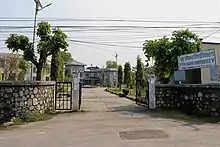पोखरा विश्वविद्यालय | |
 Entrance gate of Pokhara university | |
| Type | |
|---|---|
| Established | 1997 |
| Chancellor | Prime Minister of Nepal |
| Vice-Chancellor | Prem Narayan Aryal |
| Students | 34,151 |
| Location | , Nepal 28°08′50″N 84°04′56″E / 28.1473°N 84.0822°E |
| FSU Chairman | Sunil Timalsena (NSU) |
| Colors | |
| Website | www |

Pokhara University (PU or PoU) (Nepali: पोखरा विश्वविद्यालय) was established in 1997 (2054 B.S.) and is Nepal's fifth university.[1][2][3] Its central office is located in Pokhara, Kaski District, Gandaki Province. Along with Purbanchal University, PU was formed as part of a government initiative to improve access to higher education. The Prime Minister of Nepal is the university chancellor and the Minister of Education is the pro-chancellor. The vice chancellor is the principal administrator of the university.
Location
.jpg.webp)
Pokhara University is located in Khudi-Dhungepatan, Pokhara Lekhnath Municipality, Kaski District, 13 km east of Pokhara city (Prithvi Chowk). It also operates an academic complex in Seven Lake City, Lekhnath, surrounded by several peaks of the Himalayan mountain range. Begnas Lake and Rupa Lake are within walking distance of the university's central office.
The School of Engineering, The School of Health & Allied Sciences, The School of Business, and The School of Development and Social Engineering are housed in buildings located on the bank of the Khudi river.
Academic offerings
Pokhara University began offering degrees following the Pokhara University Act of 1997.
Pokhara University has four Constituent Schools where Bachelor's, Master's, and PhD degree programs are offered. There are 57 academic institutions affiliated with PU, also offering Bachelor's, Master's, M.Phil. and PhD. degree programs.
Teaching
The university uses a semester system. All bachelor's degrees are four years (delivered over eight semesters) and master's degrees are an additional two years (delivered over an additional four semesters). The Philosophy degree requires one and a half years (three semesters) of study. All programs are carried out in English.
There are four faculties:
- Faculty of Sciences and Technology
- Faculty of Management Studies
- Faculty of Humanities and Social Sciences
- Faculty of Health Sciences
Constituent campuses
Constituent colleges (4)
- School of Business
- School of Health and Allied Sciences
- School of Engineering
- School of Development and Social Engineering
Joint constituent colleges (4)
Scholorship
As the largest scholarship-providing university in Nepal, Pokhara University provides scholarships to 10 percent of approved students in affiliated colleges and 20 percent of approved students in constituent schools. Graduates from either government or non-government schools or colleges are eligible to apply for scholarships and other financial support.
Up until 2017, any students who passed the SLC test in government schools were eligible to receive scholarships; however, starting in 2021, students who have graduated from class 6 through 10 at a government school are given priority. Any remaining scholarships are then distributed to students who graduated from class 10 at a government school. Students from non-government schools can also apply, but it is nearly impossible for them to receive a scholarship under this new scheme.
The PU Scholarship Selection Examination determines eligibility to receive scholarships based on applicants' entrance scores and other credentials.[4]
References
- ↑ "Pokhara University Act, 2053 (1996) – Nepal Law Commission". Nepal Law Commission. Retrieved 30 March 2019.
- ↑ "Ranking Web of Universities: More than 28000 institutions ranked". www.webometrics.info. Retrieved 30 March 2019.
- ↑ Bajracharya, Dayananda Science and Technology in Nepal p172, Royal Nepal Academy of Science and Technology, 2001
- ↑ https://scholarship.pu.edu.np